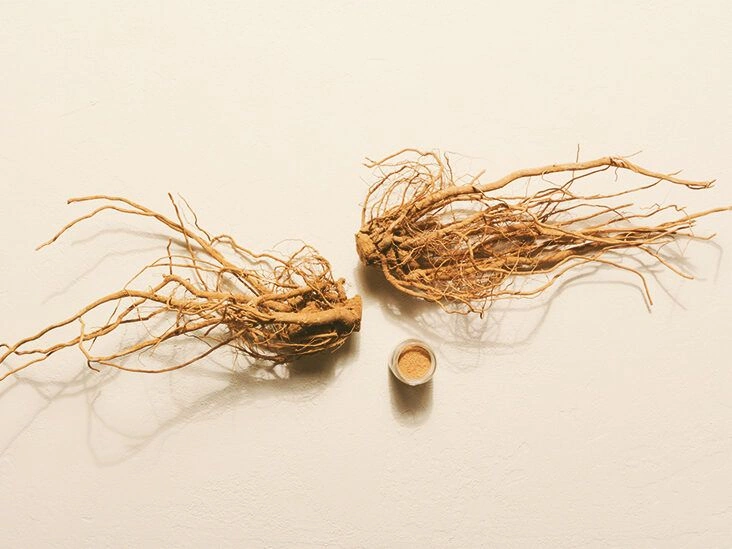While studies on the subject are not extensive, there is some indication that particular herbs can alter hormone concentrations in the body as well as other functions of the endocrine system.
Herbs are plants whose leaves, flowers, roots, and seeds are used for a variety of purposes.
If you enjoy cooking, you probably recognize many herbs as culinary ingredients. Interestingly, people have also relied on them for healthcare, spiritual practices, and other uses for millennia.
Historically, certain herbs have been used to help regulate hormone levels. Still, distinguishing reliable information from myths can be difficult when evaluating herbs for medical or wellness purposes.
For that reason, we reviewed the scientific literature and compiled this list of five herbs that have some evidence supporting their hormone-modulating claims.

A word of caution
Safe and effective ways to use herbs to influence hormone levels are not firmly established. Misinformation around herbal medicines and nutrition can obscure which assertions about herbs are evidence-based.
An herbal remedy that is safe for one person may be harmful to another. People who are pregnant, breastfeeding, on hormone therapy, living with endocrine or mental health conditions, or who have cancer may be especially vulnerable to adverse effects.
Hormones and your health
Hormones are chemical messengers that let your cells communicate and trigger a variety of processes. They form the core of the endocrine system, which controls growth, reproduction, metabolism, temperature, and even mood.
The endocrine system and hormones help maintain the body’s internal balance, or homeostasis. Therefore, hormonal imbalances — having too much or too little of a particular hormone — can produce harmful consequences.
Oxidative stress, infertility, and endocrine disorders such as thyroid disease are a few conditions that can develop from hormonal dysregulation.
Women experience natural hormonal shifts during key life stages including puberty, pregnancy, and menopause.
Men also may notice signs of hormonal imbalance during puberty or as they age, although changes are often slower and less obvious than in women.
SUMMARYSome women may consider herbal hormone support during life stages like puberty, pregnancy, and menopause. Others might explore herbs for hormone balance due to health or aging-related concerns.
1. Nigella seeds
Nigella sativa, also called kalonji or fennel flower, produces small black seeds rich in antioxidants. These seeds have medicinal potential because they contain thymoquinone, a plant-derived compound.
Researchers are examining nigella seed’s protective and therapeutic effects for people with polycystic ovary syndrome (PCOS), a condition linked to abnormal hormone levels among other symptoms in reproductive-aged women.
In animal experiments, extracts of nigella seeds have been shown to influence insulin, testosterone, luteinizing hormone, and thyroid hormones, among others.
Additionally, Nigella sativa extract demonstrates estrogen-like activity, meaning it can mimic the hormone estrogen in some ways.
Some rat studies are assessing whether nigella seed extracts could serve as an alternative to hormone replacement therapy (HRT) during menopause, when natural estrogen production typically declines.
Concentrated Nigella sativa supplements are increasingly popular and often labeled as “black seed” or “black cumin seed.” Whole nigella seeds have a herbaceous aroma and can be sprinkled on bread, salads, and other dishes (15, 16).
Keep in mind that most research on nigella seeds and hormones used animal models and concentrated extracts or isolated thymoquinone. Thus, while culinary use of whole seeds can be nutritious and tasty, it may not provide the same effects noted in studies.
SUMMARYConcentrated nigella seed extracts contain thymoquinone, a plant compound. Preliminary research, largely in animals, suggests thymoquinone may act like estrogen and could potentially ease menopausal symptoms.
2. Ashwagandha
Ashwagandha, also known as winter cherry, Indian ginseng, or Withania somnifera, is an evergreen shrub in the nightshade family. It is valued in herbal medicine, and many ashwagandha supplements, teas, and powdered roots are widely sold.
This adaptogenic herb is believed to help the body manage stress by modulating the hypothalamic-pituitary-adrenal (HPA) axis in the brain. The HPA axis produces hormones such as cortisol that orchestrate the body’s stress response (17).
Cortisol supports coping with stressful situations, but chronic dysregulation of this hormone has been linked to endocrine issues like Addison’s disease and Cushing’s syndrome in both human and animal studies.
In one 2019 trial of 60 adults, participants taking 125–300 mg of ashwagandha root extract twice daily for 8 weeks experienced reduced stress, improved sleep, and lower blood cortisol compared with placebo. A 2012 study with a similar design reported comparable findings.
Ashwagandha may also influence other hormones; researchers are studying its effects on insulin, reproductive hormones, and more.

A 2018 eight-week trial in adults with elevated thyroid-stimulating hormone (TSH) — a pituitary hormone used to evaluate thyroid function — reported that 600 mg of concentrated ashwagandha extract daily improved TSH levels (26, ).
However, some studies show inconsistent results regarding ashwagandha’s benefits.
Participants in clinical trials have reported side effects from ashwagandha, and it may be unsafe for pregnant or breastfeeding people, and those with autoimmune or thyroid conditions (, 28, , 30).
Overall, larger human trials are required to draw firmer conclusions.
SUMMARYBy supporting brain pathways involved in hormone production and regulation, ashwagandha may help normalize cortisol and thyroid hormone levels. More research is needed to confirm these effects.
3. Black cohosh root
Black cohosh belongs to the same botanical family as Nigella sativa — often called the crowfoot or buttercup family. It’s also referred to as bugbane or rattleweed.
The supplement is typically made from the powdered roots of the black cohosh plant and is taken as capsules, extracts, or teas (32, ).
The herb’s activity is thought to stem from compounds called triterpene glycosides, although the quantities of these constituents in supplements are not well established.
Traditionally and today, black cohosh has been used to support women’s health issues like irregular periods, premenstrual syndrome (PMS), and menopausal symptoms.
Like Nigella sativa, black cohosh may act as a phytoestrogen — a plant compound that can resemble estrogen when consumed in sufficient amounts. However, whether black cohosh is truly a phytoestrogen or works through different pathways is still uncertain.
Some trials have found black cohosh to reduce menopausal symptoms more effectively than placebo or no treatment.
Nonetheless, more robust human research is required, especially given reports of adverse and sometimes serious side effects. It’s wise to consult a healthcare provider before using the herb.
SUMMARYBecause of its estrogen-like properties, black cohosh is another herb considered for supporting women’s reproductive health and easing menopausal complaints.
4. Chasteberry
Chasteberry is a common herbal supplement that is often sold as an extract or in capsules.
It’s frequently combined with other herbs such as black cohosh and promoted as a treatment for menopausal symptoms and to support female reproductive health (48).
Chasteberries are the fruit of the Vitex agnus plant, also known as chaste tree, monk’s pepper, or vitex.
The berries contain diterpenoids, which may underlie the supplement’s potential influence on hormones like prolactin and the neurotransmitter dopamine.
Several reviews have concluded that chasteberry may reduce circulating prolactin levels. High prolactin is often linked to PMS, and the herb may also relieve PMS symptoms such as breast tenderness.
Other studies have examined the herb’s capacity to ease menopausal issues and assist in treating infertility and PCOS.
Although chasteberry seems to affect hormones like prolactin, more human research is necessary before firm conclusions about its efficacy can be made.
SUMMARYChasteberry may help balance hormones by lowering prolactin levels. By reducing prolactin, it could help alleviate some PMS symptoms.
5. Marjoram
Marjoram and related herbs in the Origanum genus, including oregano, have long been used in traditional medicine for various complaints.
The herb contains bioactive constituents such as flavonoids and phenolic acids, which likely contribute to its medicinal effects.
Preliminary human and animal research has explored marjoram’s potential to reduce stress and help people with PCOS.
For instance, a recent animal study showed that rats with induced PCOS exhibited improved estradiol levels after treatment with marjoram extract.
In one small human trial, participants with PCOS consumed marjoram tea twice daily for a month. Compared with placebo, marjoram tea was associated with significant reductions in fasting insulin, suggesting possible improvements in blood sugar control.
However, it’s premature to determine the best ways to use marjoram as an herbal therapy for hormonal issues. Some experts also caution that research on the safety of long-term or high-dose use of hormone-affecting herbs is lacking.
SUMMARYMarjoram appears to influence cortisol, estradiol, and insulin. Though used for generations, researchers are still determining the safest and most effective applications.
Other ways to balance your hormones
Herbal medicines are only one option among many for addressing hormonal imbalances.
Herbs may be most beneficial when combined with other evidence-based approaches.
The right treatment depends on the cause of the imbalance, your lifestyle, and other factors. Therefore, consult your doctor or healthcare provider before using medicinal herbs or beginning any form of hormone therapy.
Here are some general strategies to support hormonal balance:
- Eat a healthy diet. A diet rich in lean protein, healthy fats, and fiber while limiting processed sugars may help stabilize hormones that control appetite, metabolism, and mood.
- Drink green tea. Green tea may aid insulin regulation in some people by improving the body’s response to the hormone, although the effects of green tea extract on insulin resistance need further research.
- Get regular exercise. Physical activity influences appetite-regulating hormones and can improve insulin sensitivity.
- Manage your stress. Excessive stress can strongly alter hormones like cortisol and adrenaline. Calming practices such as yoga, listening to music, or walking in nature may reduce stress and help keep these hormones balanced.
- Get enough sleep. Insufficient sleep or nighttime exposure to artificial light can disrupt melatonin and cortisol and may affect insulin resistance.
- Avoid endocrine disruptors. Environmental compounds such as tobacco smoke, pesticides, plastics, flame retardants, and fragranced products can interfere with hormones and contribute to imbalances.
SUMMARYHerbs are not the only way to maintain hormone balance. Many natural measures, including a nutritious diet, consistent sleep and exercise, and stress management, also help keep hormones in check.
The bottom line
Hormone levels in the body are constantly shifting. Many factors cause daily fluctuations, and some variability is normal and necessary. However, persistent hormone imbalances can harm health.
Herbal remedies are one of several natural approaches to address changes in hormone levels. The five herbs covered here each show potential to help regulate hormones.
Because altering hormone levels can carry risks, speak with a healthcare professional before taking herbs or medications for this purpose.

























Leave a Reply
You must be logged in to post a comment.